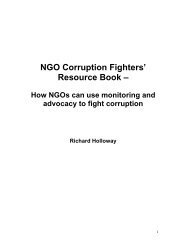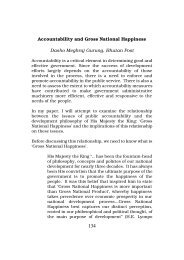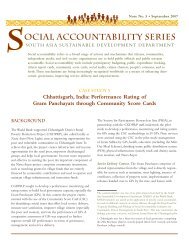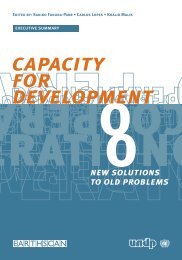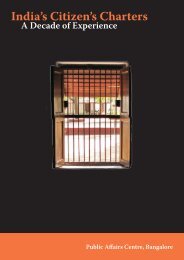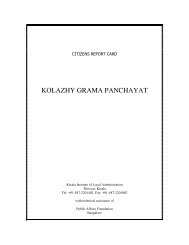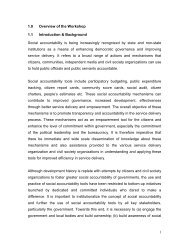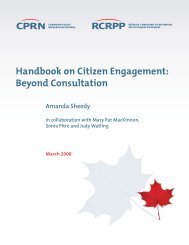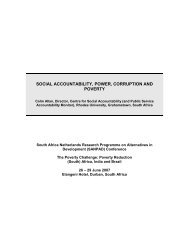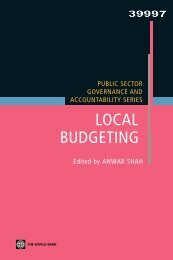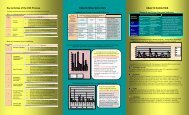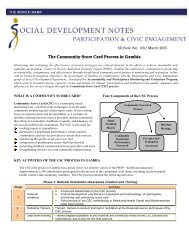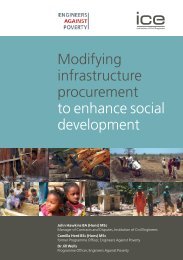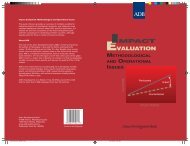Enabling Environment for Social Accountability in ... - SASANet
Enabling Environment for Social Accountability in ... - SASANet
Enabling Environment for Social Accountability in ... - SASANet
You also want an ePaper? Increase the reach of your titles
YUMPU automatically turns print PDFs into web optimized ePapers that Google loves.
Figure 3.2.3 CSO Views on Influences on Media Coverage <strong>in</strong> Mongolia (percent)<br />
100%<br />
80%<br />
60%<br />
40%<br />
20%<br />
0%<br />
Political Legal Economic SocioCultural<br />
Significant 61% 36% 50% 26%<br />
Somewhat 75% 67% 75% 52%<br />
Source: CSO Survey (Annex 6, Question EE).<br />
Although recent media monitor<strong>in</strong>g exercises show improvements, the media’s close l<strong>in</strong>ks to political<br />
parties (through their owners) result <strong>in</strong> politically biased report<strong>in</strong>g (Globe International 2005a and 2005b).<br />
M<strong>in</strong>istries and other public bodies are <strong>in</strong><strong>for</strong>mally required to subscribe to the pro-government tabloid,<br />
News of the Century, a significant economic advantage <strong>for</strong> that newspaper given the very low circulation<br />
numbers <strong>in</strong> the country.<br />
Officials often deal with critical press by resort<strong>in</strong>g to the Defamation Law, which, as noted above, can<br />
have a chill<strong>in</strong>g effect on freedom of expression. An alternative is to establish a press or media council<br />
with the power to enterta<strong>in</strong> and resolve compla<strong>in</strong>ts from the public (see box 3.2.5).<br />
Box 3.2.5 The UK Press Compla<strong>in</strong>ts Commission<br />
The Press Compla<strong>in</strong>ts Commission (PCC) is the lead<strong>in</strong>g body <strong>in</strong> the United K<strong>in</strong>gdom <strong>for</strong> deal<strong>in</strong>g with compla<strong>in</strong>ts<br />
about the pr<strong>in</strong>t media. Its members are appo<strong>in</strong>ted by an Appo<strong>in</strong>tments Committee, which is dom<strong>in</strong>ated by<br />
nonjournalists; and a majority of the PCC’s members are also from outside the media. Press members are<br />
nom<strong>in</strong>ated by various media bodies, while lay members are selected on a competitive basis.<br />
The PCC has adopted a Code of Practice <strong>for</strong> the pr<strong>in</strong>t media, which deals with issues rang<strong>in</strong>g from a right of reply<br />
and accuracy to payment <strong>for</strong> articles. Several of the PCC articles may be overridden if this serves the overall<br />
public <strong>in</strong>terest; <strong>for</strong> example, if it prevents the public from be<strong>in</strong>g misled or exposes a serious crime.<br />
Compla<strong>in</strong>ts are free and do not require a lawyer. The procedure <strong>for</strong> process<strong>in</strong>g compla<strong>in</strong>ts is simple: <strong>in</strong> 2004, the<br />
average compla<strong>in</strong>t was processed <strong>in</strong> 17 days. The vast majority of compla<strong>in</strong>ts are resolved through mediation.<br />
When the PCC adjudicates a compla<strong>in</strong>t and f<strong>in</strong>ds <strong>in</strong> favor of the compla<strong>in</strong>ant, the newspaper concerned must<br />
pr<strong>in</strong>t a copy of the adjudication, under a headl<strong>in</strong>e that refers to the PCC. At many newspapers, compliance with<br />
the Code of Practice is also part of the contractual obligations of editors, offer<strong>in</strong>g another means of en<strong>for</strong>cement.<br />
The more than 3,500 compla<strong>in</strong>ts lodged with the PCC <strong>in</strong> 2004 are evidence of its success <strong>in</strong> redress<strong>in</strong>g<br />
unprofessional behavior <strong>in</strong> the pr<strong>in</strong>t media sector.<br />
Mongolian stakeholders expressed general support <strong>for</strong> the idea of a press council. Overall, the preference<br />
was <strong>for</strong> a nonstatutory, self-regulatory <strong>in</strong>itiative led by the media sector, although the possibility of a<br />
mixed statutory but media-led council was also canvassed by some stakeholders. The need <strong>for</strong> better<br />
tra<strong>in</strong><strong>in</strong>g <strong>for</strong> media workers, <strong>in</strong>clud<strong>in</strong>g editors and owners, was also often noted as a way of promot<strong>in</strong>g a<br />
more professional media sector.



